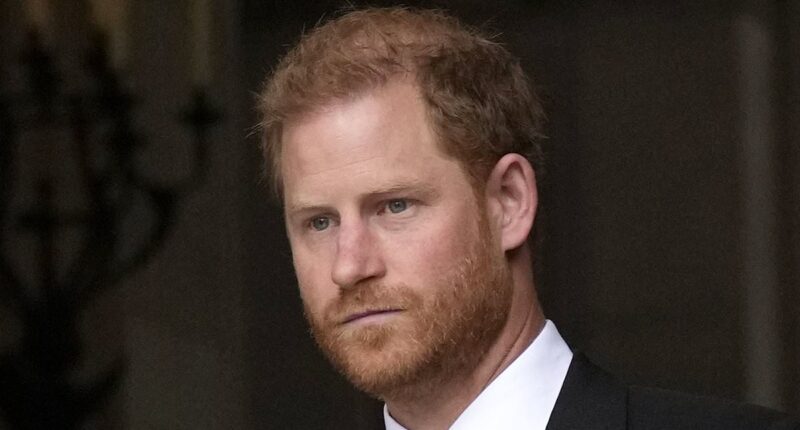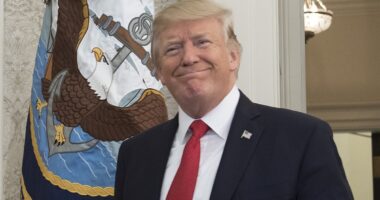The judge overseeing Prince Harry’s visa case in the United States is willing to disclose significant portions of classified documents related to the royal’s immigration status.
During a session in Washington D.C., Judge Carl Nichols urged attorneys representing Donald Trump’s Department of Homeland Security (DHS) to outline the redactions they wish to apply for, allowing him to assess the possibility of making certain details public.
The hearing was the first time the case has been in court since Trump became president on January 20.
Judge Nichols has seen secret records revealing details of Harry’s visa status but they are currently sealed.
Harry himself is not a party in the case, and was not in court.
The case was filed by the Heritage Foundation, a right-leaning research institution, following the DHS’s denial of their Freedom of Information Act request for the release of Prince Harry’s visa records.
Heritage argues that Harry should not have received a U.S. visa due to a history of drug use.
Judge Nichols said: ‘I’m not foreclosing the possibility that there might be some possible relief.’
He wanted the ‘maximum disclosure as long as it doesn’t violate privacy.’
The judge asked the DHS to provide requests for redactions or ‘continued withholdings’ from the documents he had seen in private.
John Bardo, a lawyer for the DHS, suggested the documents would be a ‘shell’ once redacted.
The judge then said he was ‘not 100 percent sure how I want to proceed’ and would let everyone know ‘in due course’.
It was the latest twist in a two-year legal saga over Prince Harry’s U.S. visa. His immigration status remains publicly unknown. Possibilities include a regular visa, green card, and diplomatic visa.
Judge Nichols had previously ruled on September 9 that the secret records should remain private.

Prince Harry moved to the US with his wife Meghan Markle after stepping down as senior royals
Speaking outside court following the hour-long hearing, Nile Gardiner, of the Heritage Foundation, said: ‘We are pushing for the Trump administration to release the records, and we have urged President Trump to release the records
‘We hope that with a new president there will be full transparency.’
In 2023, in his controversial memoir ‘Spare,’ Harry made a series of admissions about drugs, including that cocaine ‘didn’t do anything for me.’
Heritage wants to know why he was allowed into America in 2020, after stepping down as a senior royal with wife Meghan Markle.
It argues that, considering the drug admissions, U.S. law ‘generally renders such a person inadmissible for entry’ to the country.
It alleges that either Harry did not give the correct information on his visa application about his drug use, or that he was has given special treatment by Joe Biden’s administration in order to emigrate to the country.
Sources close to the Duke have previously indicated that he answered truthfully on his visa application.
The foundation accuses the Biden administration of ‘bad faith’ and having ‘bent over backwards to protect Prince Harry.’
In the DHS’s response to the legal claim last year, it said: ‘Much like health, financial, or employment information, a person’s immigration information is private personal information.’
On September 9, Judge Nichols ruled that ‘the public does not have a strong interest in disclosure of the duke’s immigration records.’

US President Donald Trump is pictured at the White House. He previously said in an interview in March last year that Prince Harry should not receive preferential treatment
The judge – who was appointed by Mr Trump in 2018 – made his decision after viewing the secret documents provided by the DHS in private.
He then sealed his order so it was not known why he made the decision.
In his September ruling he said: ‘Like any foreign national, the Duke has a legitimate privacy interest in his immigration status.’
The Heritage Foundation asked for the judgment to be changed, which led to Wednesday’s ‘motion for relief from judgment’ hearing.

US judge Carl Nichols previously ruled that the immigration records should not be made public

The case is being heard at the US District Court in Washington
Trump could potentially intervene and ask for the documents to be released.
He said in a GB News interview with Nigel Farage in March last year that Harry should not receive preferential treatment.
However, Mr Trump refused to be drawn on whether Harry could be forced to leave the U.S., where he currently lives with Meghan and their children.

Donald Trump and Queen Elizabeth II at a state banquet at Buckingham Palace in June 2019
‘Oh, I don’t know,’ he said. ‘You’ll have to tell me. You just have to tell me. You would have thought they would have known this a long time ago.’
Last week, former UK Home Secretary Suella Braverman gave her support to the Heritage Foundation over its legal bid in a social media video.
She said: ‘I think there’s a very strong case for President Trump to intervene and to direct the release and disclosure of these documents.
‘The American people should have the right to know what’s happened here. Prince Harry is a citizen who has come to the United States.
‘We need to know whether he broke the rules to get into the United States. If he did the American people have a right to know and those who allowed that to happen should be held to account.’

Charles and Camilla meet the Trumps at Clarence House in London in December 2019
When applying for a non-diplomatic U.S. visa foreigners are asked on the DHS’s DS160 visa form: ‘Are you or have you ever been a drug abuser or addict?’
They are also asked whether they have ever ‘violated any law relating to controlled substances’.
If they answer ‘yes’ they can still receive a waiver.
However, it has not been confirmed which type of visa the royal applied for.
Last year, Dailymail.com revealed that Harry could be on a rare diplomatic visa known as an A-1 Head of State visa.
That would have meant he was not vetted by U.S. authorities for past use of drugs.
According to the U.S. Code of Federal Regulations ‘members of a reigning royal family’ qualify for a standard A-1 diplomatic visa but it is intended for when they are performing official duties.
A holder of an A-1 Head of State visa can be in the U.S. regardless of their purpose of travel, and can work if they so wish.
In receiving one there is a discretionary exception for anyone ‘individually authorized’ by the U.S. State Department.
The Duke would have ‘duration of status’ and just need to be re-vetted ‘from time to time.’
It leaves open the possibility the Duke could have his status withdrawn by the U.S. State Department.

















